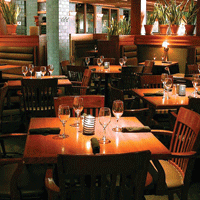Canyon Creek shines the spotlight on Southern Ontario’s local fare
It’s not breaking news that the local-food movement is growing in popularity. But, so far, “going local” has largely been the domain of independent restaurants with chefs who often have greater autonomy, more flexible budgets and the feasibility to create distinctive dishes based on what’s growing in local farmer’s fields.
“Local has been at the forefront of a lot of independent restaurants, but it’s very unique for a multi-unit or chain restaurant to execute a similar program,” says John Bishop, director of Purch-asing for Milton, Ont.-based produce supplier Fresh Start Foods. Over the past few years, however, Bishop’s company has been working closely with Canyon Creek Chophouse — an upscale-casual restaurant chain owned by the Burlington, Ont.-based SIR Corp., with eight locations in Southern Ontario — to help the chain’s executive chef, Mark Jachecki, cook with as much local food as possible.
The toque goes beyond making it a priority to use local ingredients where he can on the chain’s year-round menu, but he’s also been orchestrating a limited-time Local Harvest menu — offered throughout September and October — every fall since 2009. The idea is to spotlight the best of Ontario’s fall produce. “We don’t celebrate what we have in Ontario enough,” asserts Jachecki. And the hard work he’s put into the promotion has paid off, as the menu has quickly become an anticipated annual event. “Around June or July, we get some regulars coming in asking, ‘When is the Local Harvest menu coming back?,’” he says. “They really look forward to it.”
For Jachecki, it’s not good enough to simply describe the ingredients as “local” for the customers — he makes sure the farmers and suppliers are the stars of the show, naming them in a prominent place on the Local Harvest menu. Bishop was impressed with this idea: “By actually listing the names of the growers on the menu, it really adds credibility,” he says.
As a farmer involved in the Local Harvest menu, Jason Verkaik, owner of Carron Farms in Bradford, Ont. (near the Holland Marsh), appreciates having his farm’s name featured on the menu, too. “To me it’s exciting to see that kind of connection,” says Verkaik. “What they’re doing is connecting people with the farm through their restaurant, and a lot of people are looking to be connected with farms in today’s local-food movement. This is a very positive step, and it’s fun to be part of that.”
Jachecki also works to ensure the Canyon Creek staff understands the ingredients showcased in the menu. So, in 2009, the first year of the Harvest program, he had some of his local farming partners visit a Canyon Creek restaurant to talk to the employees about their farms and produce. As a result, the waiters and chefs had knowledgeable answers to customer questions about the ingredients. In 2010 and 2011, he took the lesson a step further, arranging a staff visit to the farms for a first-hand look at the growing and harvesting process.
The chef fondly recalls a particular visit to Carron Farms where employees saw how heirloom carrots — a popular item on the Local Harvest menu — were grown and harvested. “I really felt like they got it,” Jachecki says. “It was an eye-opening experience. Pulling the carrots from the black earth, showing them that these are not manufactured; there are big ones and small ones side by side, they’re not going to come in all the same size to you…. It gave the chefs more respect for the process.”
Communication and collaboration with his suppliers is important to Jachecki. For last year’s Local Harvest menu, Jachecki called Bradford, Ont.’s Carron Farms’s Verkaik in the spring and asked the producer if he could grow tomatillos — a small tomato-like fruit native to Mexico — for the special fall menu. Verkaik had never grown them before, but he gave it a shot and was thrilled with the result. The tomatillos were featured in a popular new dish on the 2011 Local Harvest menu called the King Cole Smoked Duck Salad ($14.50, pictured). The special featured smoked duck from King Cole in Newmarket, Ont.; the tomatillos from Carron Farms (which were pickled for the dish); goat cheese from Woolwich Dairy Inc. in Orangeville, Ont.; tart cherries from Cherry Lane in Niagara, Ont.; and apple cider-raspberry dressing from Wellesley Brand Apple Products in Wellesley, Ont.
Other Harvest Menu favourites include the Grilled Ontario Pork Chop ($25.95) with pork from Southern Ontario’s Conestoga Meat Packers cooperative. It was served with sweet potato mash from Weninger Farms in Alymer, Ont., braised red cabbage from BMW Farms in Stayner, Ont., buttered heirloom carrots from Carron Farms, Bradford, Ont., apple cider and Holland Marsh green tomato jam. For dessert, a Pumpkin Crème Brulée ($3.95) showcased pumpkins from O’Neill and Farms in Chatham, Ont., and cream from the Ontario Dairy Farmers. And, to wash it down, there was Muskoka Brewery Harvest Ale ($6.50), a rich, full-bodied ale brewed from locally sourced ingredients.
The Local Harvest menu displays Canyon Creek’s commitment to local in a more intensely focused way than during the rest of the year, but the chain is committed to using local suppliers wherever possible year-round. “We don’t want to get preachy and in-your-face about local, but we do make it a priority to let customers know how much local we use,” says Jachecki, who sources approximately 50 per cent of his ingredients in Canada throughout the year, a number that increases to almost 90 per cent during the Local Harvest Menu promotion.
When asked about the cost challenges of slow food, he says the prices aren’t as high as one might think. Organic is often quite a bit more costly, he says, but “we don’t profess to be organic.” If he can find something organic and also affordable, he’ll use it, but otherwise, the main priority for Jachecki is local food. “I don’t find that the local products we use are that much more expensive.”
Jachecki gives credit to Fresh Start for helping source local produce. “They’re good at it. That’s what they do,” he says, adding that he sees no reason to run around trying to do the sourcing himself when an expert like Bishop can help. Bishop, in turn, is quick to praise the Canyon Creek chef. “I give him a list of ingredients available in the timeframe, and he uses his creative flair to pull something out of a hat and work around what’s available,” he says. “He’s done an excellent job of this — not only with the produce, but also with the protein and the rest of the menu; the wines and everything else.”
Because Canyon Creek’s eight locations are fairly close in proximity, Jachecki and Bishop agree that executing a chain-wide local menu is easier than if the locations were spread among different provinces. But Bishop doesn’t see it as impossible for a cross-Canada chain to buy local — it would just be a bit more difficult to source different suppliers in different areas. In fact, he thinks it will soon become increasingly necessary, as more Canadians start demanding local ingredients on their restaurant plates. “Customers are going to start challenging restaurants and asking more questions, and a lot of the chains are going to have to start doing more,” he predicts.
Keep Reading
Farm to Fork: He Said/She Said
Farm to Fork: Blueprint for Change
Farm to Fork: Reinventing the Cheese Wheel





















